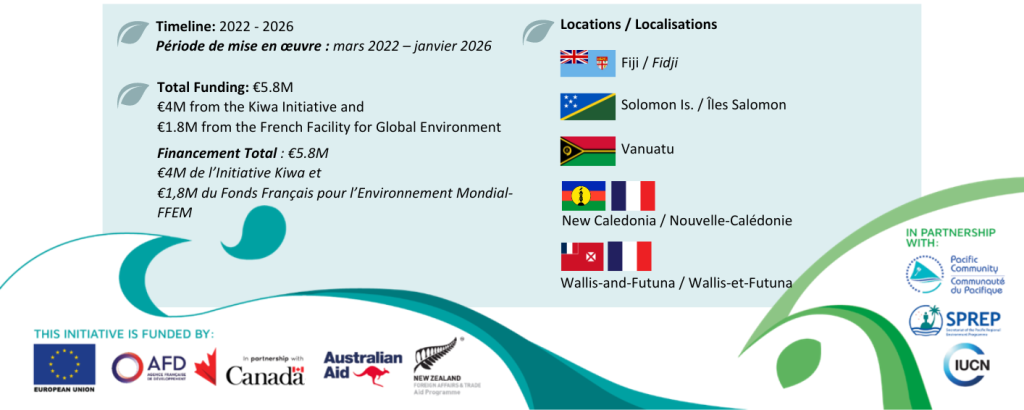
-1.jpg) Maramasike, Solomon Islands © Stuart Chape
Maramasike, Solomon Islands © Stuart Chape
Pacific Ecosystem-based Adaptation to Climate Change + Project
The Pacific Ecosystem-based Adaptation to Climate Change Plus (PEBACC+) Project seeks to strengthen the resilience of ecosystems, economies, and communities to the impacts of climate change in Fiji, New Caledonia, Solomon Islands, Vanuatu, and Wallis-and-Futuna. The PEBACC+ Project will develop, sustain, and institutionalise ecosystem-based adaptation (EbA) to climate change in these five countries and territories.
The four-year project is implemented by SPREP with a funding of €4M by the Kiwa Initiative through the Agence française de développement (AFD) and €1,8M by the French Facility for Global Environment.
The project is a continuation of phase one funded by International Climate Initiative and implemented by SPREP from 2015 to 2020 in Fiji, Solomon Islands and Vanuatu. It is also a follow up on the outcome of the Pacific Adaptation to Climate Change and Resilience Building (PACRES) project work implemented from 2019 to 2023. PEBACC phase one developed and implemented a systematic and participative approach to analysing climate and non-climate threats to communities and ecosystem as a basis for adaptation planning in several pilot sites through the application of ecological and socio-economic resilience assessment mapping (ESRAM) at various scales. This work has led to the development of comprehensive master plans in close collaboration with stakeholders and local communities.
The PEBACC+ project will strengthen existing activities, diversity them and integrate EbA and nature-based solutions (NbS) into public policies to ensure its sustainability. The French territories of New Caledonia and Wallis-and-Futuna will also benefit from PEBACC+ implementation.
Projet d'adaptation au changement climatique basé sur les écosystèmes du Pacifique +
Le projet régional PEBACC+ (Pacific Ecosystem-Based Adaptation to Climate Change Plus) vise à renforcer la résilience des écosystèmes, des économies et des populations par la mise en œuvre démonstrative, la planification et l’institutionnalisation de l’approche de l’Adaptation fondée sur les Ecosystèmes (AfE) et les Solutions fondées sur la Nature (SfN) pour l’adaptation au changement climatique.
Le projet sera mis en œuvre aux Fidji, aux îles Salomon, au Vanuatu, à Wallis-et-Futuna et en NouvelleCalédonie.
PEBACC+ est mis en œuvre par le PROE avec un financement de 4 M€ de l'Initiative Kiwa à travers l'Agence française de développement (AFD) et de 1,8M€ du Fonds français pour l'environnement mondial (FFEM).
Objectives
- Develop, support and institutionalise the ecosystem-based approach to climate change adaptation in Fiji, New Caledonia, Solomon Islands, Vanuatu, and Wallis-and-Futuna.
- Consolidate EbA experience at previous demonstration sites and expand it to new areas, to diversify adaptation options through NbS, including New Caledonia and Wallis-and-Futuna. These activities will contribute to the institutionalisation of EbA at national and local levels and ensure its sustainability.
- Strengthen regional cooperation among Pacific Island countries and territories by sharing experiences and lessons learned, promote and replicate the project concept to increase resilience of Pacific communities to climate change impacts.
Objectifs
Développer, soutenir et institutionnaliser l'adaptation au changement climatique fondée sur les écosystèmes (AfE) dans les îles de Fidji, du Vanuatu, de Salomon, de la Nouvelle-Calédonie ainsi que de Wallis-et-Futuna.
Intégrer et appuyer la mise en oeuvre de l'approche Adaptation fondée sur les écosystèmes (AfE) et des Solutions fondées sur la nature (SfN) en tant que stratégie contribuant à l'adaptation au changement climatique en Nouvelle-Calédonie et à Wallis-et-Futuna.
Renforcer la coopération régionale entre les Etats et Territoires Insulaires du Pacifique en favorisant le partage des expériences et des enseignements tirés des projets, afin d'accroître la résilience des populations, et promouvoir le concept dans toute la région du Pacifique.
Project interventions
- Training for decision makers on EbA and NbS approaches, green infrastructure, and environmental protection.
- Mainstreaming EbA into climate adaptation strategies.
- A reforestation and agroforestry program in Taveuni, Fiji.
- Support the Blue Town initiative (integrated coastal zone management plan) in Savusavu, Fiji.
- Support the ecosystem and forest rehabilitation and a resource center in the Barana Community Nature and Heritage Park, Solomon Islands.
- Restoration of the Tagabe River catchment area in Port Vila, Vanuatu.
- Support reforestation, agroforestry, and the creation of a locally managed marine area in Lenakel, Tanna Island, Vanuatu.
- Support the EbA and implementation of NbS in New Caledonia and Wallis-and-Futuna through forest restoration, agroforestry, and fire prevention for water security, mangrove and coastal vegetation restoration for coastline erosion prevention. Activities also include resilience analysis and mapping as well as prioritisation of EbA options.
Interventions du projet
Formations aux approches sur les Ecosystèmes (AfE) et des Solutions fondées sur la Nature (SfN) à destination des décideurs.
Analyse et cartographie de la résilience des écosystèmes, économies et populations (processus ESRAM) et intégration de l’AfE et des SfN dans les politiques, stratégies et feuilles de route de la Nouvelle-Calédonie et Wallis-et-Futuna.
Reboisement et agroforesterie à Taveuni (Fidji).
Blue Town : gestion intégrée des zones côtières à Savusavu (Fidji).
Réhabilitation des écosystèmes du centre d'information du parc naturel et patrimonial communautaire de Barana (Îles Salomon).
Restauration du bassin versant de la rivière Tagabe (Port-Vila, Vanuatu).
Reboisement, agroforesterie et création d’une aire marine communautaire à Lenakel (Tanna, Vanuatu).
Conception et mise en œuvre de Solutions fondées sur la nature (SfN) en Nouvelle-Calédonie et à Wallis-et-Futuna dont possiblement : restauration des forêts, permaculture et agroforesterie et amélioration de la maitrise des feux dans les bassins versants prioritaires pour sécuriser l’approvisionnement en eau ; restauration des mangroves et de la végétation côtière et protection du littoral...
